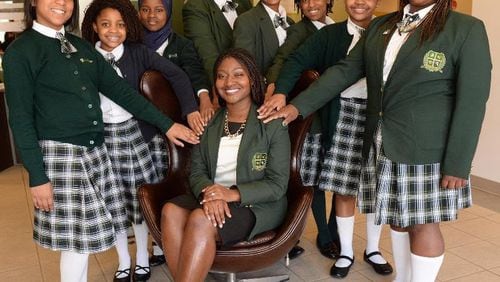Alisha Cromartie, formerly Alisha Morgan, was an early supporter of charter schools, breaking with Democratic colleagues in the Georgia House to endorse the concept early on.
In 2002, at age 23, Cromartie became the first African-American to represent Cobb County in the state House of Representatives. In 2014, she ran and lost a bid for state superintendent. A year later, Cromartie took a job leading what was considered a Georgia charter school success story, Ivy Preparatory Academy, which began in Gwinnett but expanded to DeKalb.
However, the flagship Gwinnett location has experienced financial strain, enrollment drops and parent complaints, and three weeks ago won approval of the State Charter Schools Commission to close next year, regroup and re-open the year after in a new location.
In this column, Cromartie maintains the funding challenges that constrain Ivy Prep and other charter schools would be eased by House Bill 787, which provides additional state funding.
By Alisha Cromartie
I urge members of the Georgia General Assembly to put Georgia’s children first and approve House Bill 787. Passing the bill will help ensure that thousands of Georgia students who are enrolled in a state-authorized charter school receive the equitable education that all children deserve.
As a former Democratic state representative, I championed legislation that led to the formation of state-authorized charter schools. I believed that public charters could do more with less; I was wrong.
As superintendent of Ivy Preparatory Academies, I have seen firsthand how challenging it is for schools like mine to operate with low funding levels. Students and teachers are hurt most when we cannot afford to provide the essential resources that schools deserve, nor pay highly effective teachers a salary that validates their value and worth. We are not asking for more than what most other public schools in our state receive and deserve. Through HB 787, we are hoping to even the playing field and provide greater funding equity for state charter schools.
State-authorized charter schools in Georgia are now funded more than 20 percent below traditional public schools. The funding gap can be as much as 45 percent lower in the Atlanta area. Charter schools have to pay facilities and maintenance costs, which many local school districts provide to traditional public schools. These additional expenses are real barriers, particularly in the Atlanta metro area where rental rates and building prices are higher than many other parts of the state.
Funding inequities undermine the promise that schools make to our children. Financial terms such as balance sheets and cash flow statements rarely surface in our classrooms, but the lessons that students experience as a result of reduced funding extend beyond the school house.
At Ivy Prep Academies, we are forced to choose between supplemental curricular resources and facilities costs. We have to be creative in how we hire and retain quality teachers. We are not able to compete with districts in hiring veteran teachers, and the wonderful new teachers that we hire often move on to higher paying jobs once they are trained and coached by our team on how to effectively boost student achievement.
While operating at lower funding levels presents a unique set of challenges, an army of committed students, teachers, parents and leaders can sometimes defy odds. At Ivy Prep Academy in Kirkwood, we have recently experienced academic success: a 33-point overall increase on Georgia’s College and Career Ready Performance Index (CCRPI) and our elementary school climbed from a 43 on the 2016 CCRPI to an 85 in 2017.
Our success has been achieved through hard work and difficult decisions. Key partners like the Georgia Charter Schools Association and our authorizer, the State Charter Schools Commission, have helped us by providing board governance training, capacity building and sound advice. If we are to continue to deliver our effective educational programs and sustain academic success at our Kirkwood campus, it is essential that we receive equitable funding.
Our Ivy Preparatory Academy Gwinnett campus has a rich legacy of achievement. Unfortunately, it has become a challenge to continue to thrive under the current funding norms.
As a result, we plan to relocate the school to a more affordable building in a location that is more convenient for students and their families. Additional funding will help us offer students the very best single-gender education possible and provide them the resources their counterparts in traditional districts enjoy.
Serving as a state representative afforded me an opportunity to work with other state lawmakers to help schools and children across the state. Serving as Ivy Prep Academies superintendent has given me a valuable, front-line perspective on the needs of public schools. I call on my former legislative colleagues, both Democrats and Republicans who have been hesitant to support charter schools to vote in favor of HB 787.
Just like magnet, theme and traditional schools, charter schools are public schools. Like traditional public schools, state charter schools give parents options and provide students access to a high-quality education regardless of their zip code. In our case at Ivy, it enables us to focus on the whole girl; our scholars are more than test scores and we need the resources to prepare them for success in college and in life.







